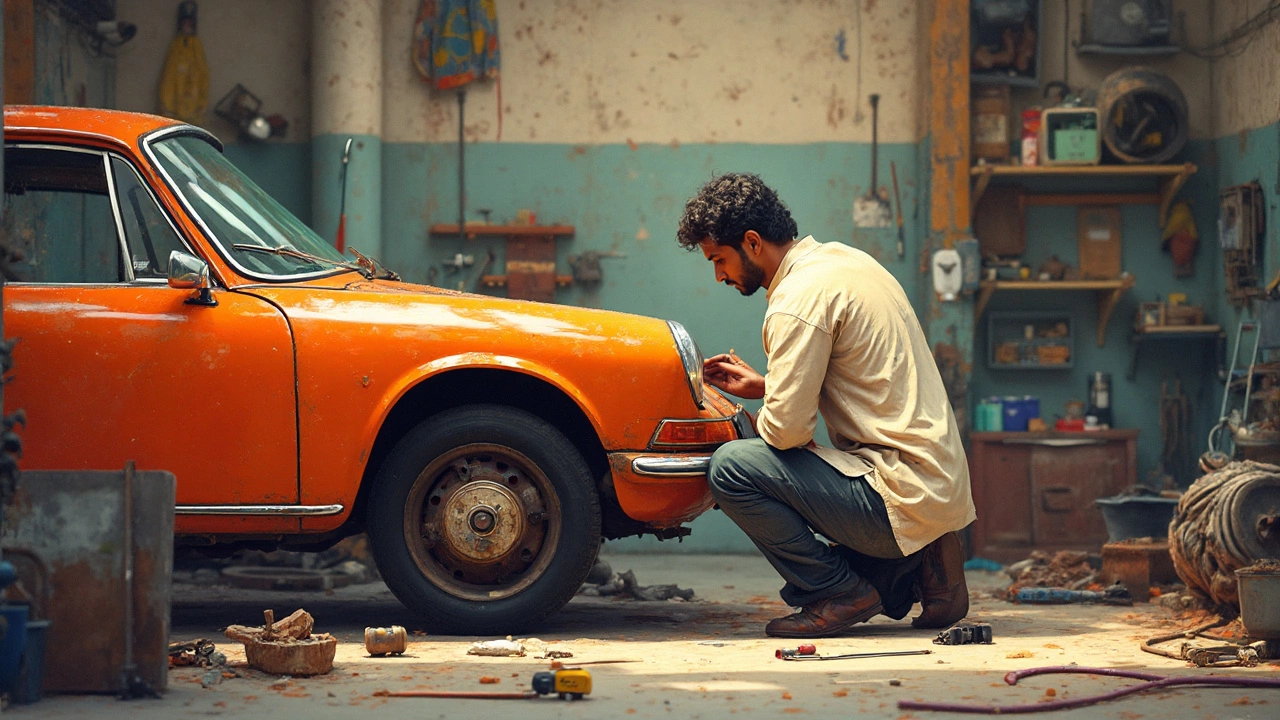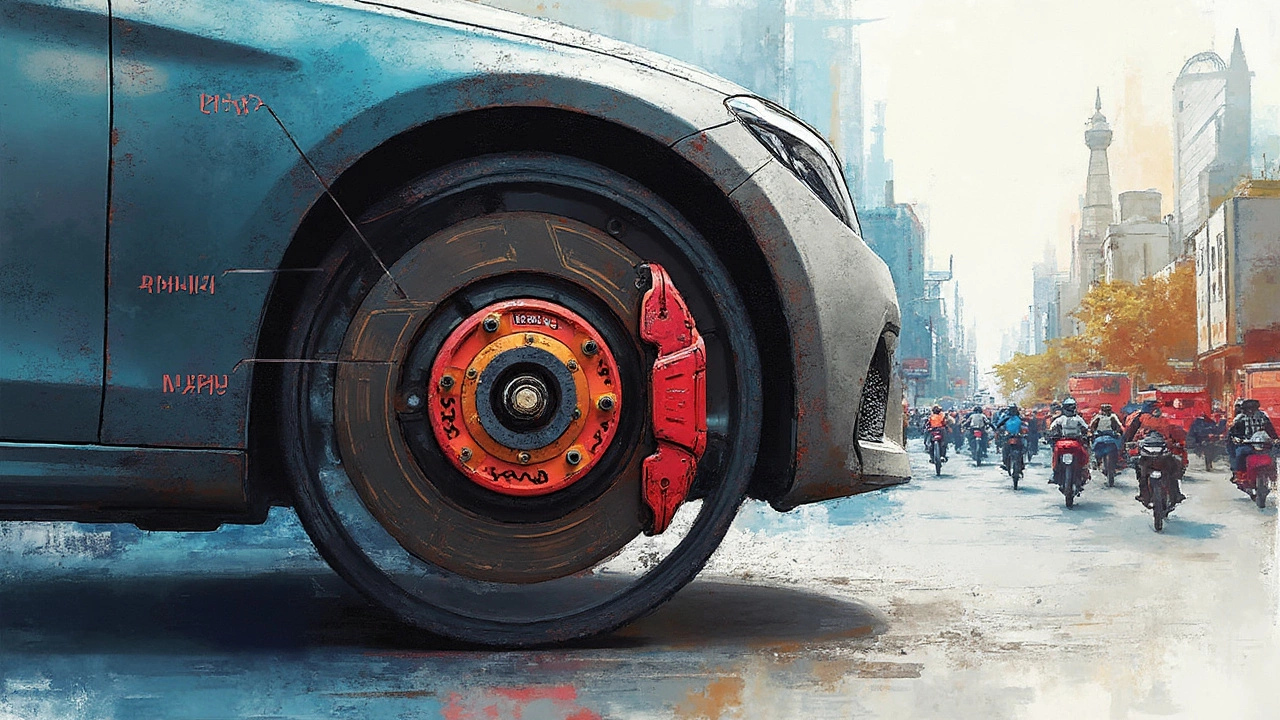Do Front or Rear Brakes Wear Out First?: Discover the Key Differences
 Feb, 17 2025
Feb, 17 2025
Have you ever wondered why your car's front brakes seem to need replacing more often than the rear ones? It's not your imagination. Typically, it's because front brakes do most of the hard work when it comes to stopping your vehicle. When you hit the brakes, the weight shifts forward, putting more pressure on the front brakes. That means they're taking on more friction and wear.
In contrast, rear brakes serve more of a support role. They're important for balance and stability but don't handle as much force. That's why they generally last longer. Knowing this can help you plan maintenance and avoid unexpected repair costs.
Understanding the different roles of your car’s brakes also means knowing when things might be going wrong. Is there a squealing noise when you stop? Maybe the brake pedal feels squishy? These could be signs that it's time to check your brake pads. Don’t ignore these signals; they’re like your car whispering, 'Hey, I need some attention!'
- Understanding Brake Functionality
- Why Front Brakes Wear Out Faster
- Signs Your Brakes Need Attention
- Tips for Extending Brake Life
- When to Replace Your Brake Pads
Understanding Brake Functionality
To truly grasp why some brakes wear out faster, you need to know what each one does. Your vehicle's braking system is a bit like a team, where each component has a role. The front brakes are the main players as they work the hardest to stop the car. They handle the majority of the braking force, thanks to simple physics. When you stop, the car's weight shifts forward, so the front is under more pressure.
Most cars utilize disc brakes on the front wheels. These brakes use calipers, brake pads, and a rotor disc to create the friction needed to stop. Think of them as the workhorses.
Rear Brakes: The Supporting Role
Now, let's chat about the rear brakes. They supplement the front brakes and help maintain balance and stability. Many vehicles have drum brakes in the rear, which rely on shoes inside a drum to create friction. Since they don't experience as much force, they last longer. However, rear disc brakes are becoming more common for better performance and wear characteristics.
The rear brakes are like the backup dancers, crucial but not in the spotlight. Together, both systems ensure you stop safely and efficiently.
Hydraulic System: Power Behind the Scenes
Your car uses a hydraulic system to make this teamwork happen. When you press the brake pedal, fluid flows through brake lines to create pressure at each wheel. This system ensures the force from your foot is evenly distributed, allowing both front and rear brakes to engage.
If the system isn’t maintained, it could lead to brake failure or uneven wear. Keeping the hydraulic fluid clean and topped off is essential for safety and performance.
Why Front Brakes Wear Out Faster
Ever wondered why your front brakes seem to tire out more quickly than the rear ones? There's a simple explanation. When you press the brake pedal, most of your car’s weight shifts to the front. This shift means the front brakes have to bear more of the stopping pressure, which results in more friction and, ultimately, quicker wear.
Role of Weight Distribution
Think of it like this: imagine carrying a heavy backpack. If you shift the pack's weight to the front, your shoulders in the front support more weight and get weary faster. Similarly, your car's front brakes absorb a significant portion of the vehicle's weight when you stop abruptly, causing them to wear out earlier.
Friction and Heat
Another reason lies in the heat and friction generated by the stopping action. The more times you stop, especially from high speeds, the more wear and tear on those front brake pads. They naturally deal with higher temperatures, and frequent heating can accelerate deterioration.
Statistics on Brake Wear
It might surprise you, but studies show that front brakes can wear out almost twice as fast as rear brakes in some vehicles. Here’s a quick glance:
| Brake Position | Lifespan (Average) |
|---|---|
| Front Brakes | 20,000 - 40,000 miles |
| Rear Brakes | 40,000 - 60,000 miles |
Considering these figures can assist car owners in scheduling timely maintenance checks.
Common Misconceptions
Some folks think all brakes wear at the same rate. Not true! And knowing this difference can actually save you money by helping you plan better for necessary replacements and avoid sudden, unexpected repairs.
So, next time you're driving around Birmingham, or wherever it is, and you notice your front brakes feeling a bit worn, remember—they're doing a lot of heavy lifting! Be kind to them; give them a check-up now and then, and they’ll keep keeping you safe on the road.

Signs Your Brakes Need Attention
When it comes to making sure your car stops right, paying attention to the front brakes and rear brakes is crucial. If something's up, they often give signs—so don't miss them.
Strange Noises
One giveaway is sound. If you hear a high-pitched squeal when you're braking, that's usually the wear indicator telling you it's time to check the brake pads. Grinding noises? That might mean metal-on-metal contact, and it's a sign you're overdue for a change.
Feeling the Vibes
Ever felt vibrations or pulsations in the brake pedal? That's a red flag that your front brakes could be warped. Generally, the pedal should feel smooth all the way down. Changes in that sensation aren’t something you want to ignore.
Pulling to One Side
If your car keeps pulling to one side when you press the brake, it’s a sign of uneven brake wear. The front brakes might be doing more work than they should. This could also mean a brake caliper isn’t doing its job.
Warning Lights
A brake warning light on your dashboard shouldn’t be taken lightly. It's like an SOS for your brakes, urging you to investigate further. Remember, ignoring brake issues can lead to bigger problems down the line.
| Common Sign | Potential Problem |
|---|---|
| Strange noises | Worn brake pads |
| Vibrations | Warped front brakes |
| Pulling to one side | Uneven brake wear |
These signs are your car's way of saying it needs a little TLC. Recognizing them early can save you from costlier repairs later and, more importantly, keep you safer on the road.
Tips for Extending Brake Life
Want to keep your brake pads lasting as long as possible? Maintaining your brakes isn't rocket science, but it does require a bit of effort and attention to detail. Below are some practical tips you can follow to squeeze every last mile out of them.
Drive Smart
How you drive can affect how fast your brakes wear out. Avoid heavy braking when you can. Anticipate stops and ease into a halt instead of jamming the brakes at the last second. This gentle approach minimizes friction on your front brakes and reduces wear.
Reduce Weight
Believe it or not, carrying around extra stuff in your car can impact your brakes. The heavier your vehicle, the harder your brakes have to work to stop it. Try to keep your car as light as possible by removing unnecessary items.
Regular Inspections
Get into the habit of checking your brakes regularly. Look for signs of excessive wear on your brake pads, like thinning or uneven surfaces. You don't have to wait for a squeal to know it's time for a replacement. Catching issues early can save your brakes and your wallet.
Flush Brake Fluid
Brake fluid is the lifeblood of your braking system. Contaminated fluid can lead to problems, so it's wise to flush and replace it according to your vehicle's maintenance schedule. Fresh fluid ensures better performance and extends the life of your brakes.
Use Quality Parts
When it comes time to replace parts, opt for quality over cost. While cheaper parts might save some cash upfront, they often wear out faster. Quality brake pads can last longer and provide better stopping power, saving you money in the long run.
Paying attention to these tips can lead to a smoother, safer drive and add miles to your brake pads’ lifespan. You don’t have to overhaul your driving habits completely; just a few small changes can make a big difference.

When to Replace Your Brake Pads
So, how do you know when it's time to swap out those brake pads? Well, ignoring it isn't an option, unless you fancy noisy rides and reduced braking efficiency. Let's break it down into a few signs and important tips.
Listen to Your Car
Your car often gives auditory cues. If you hear a high-pitched screech when you hit the brakes, it's likely the wear indicator—a metal strip—letting you know it's time for new brake pads. Don't mistake this for normal noise; it's your car's way of crying for help.
Check Your Dashboard
Some modern cars have brake warning lights. If that pops on, take it seriously. It's a good indication that either your pads are worn or there's another issue with your braking system.
Inspect the Thickness
If you're the type who likes getting hands-on, you can peek through the wheel spokes and see the brake pads. If they look thinner than about a quarter of an inch, it's definitely time to replace them. No tools required, just a keen eye!
Feel the Pedal
There's the good ol' pedal test. If your brake pedal feels soft or spongy, or if it takes longer distances to stop, that’s a red flag. It's best to consult a mechanic pronto.
Professional Advice
If DIY isn’t your thing, or you're unsure, getting a professional to check your front brakes and rear setup during regular maintenance is a smart move. They can provide an expert view on your car's braking health.
Remember: Routine Checks Save Cash
Regularly checking and replacing your brake pads can prevent damage to the rotors, which could save you a lot of stress—and money—in the long run.
Here's a quick look at what you might expect for replacement frequency based on typical driving:
| Type of Driving | Brake Pad Lifespan |
|---|---|
| City Driving | 20,000 - 30,000 miles |
| Highway Driving | 30,000 - 70,000 miles |
If you're mostly cruising smoothly on motorways, you'll likely need replacements less often than those navigating stop-and-go city traffic.